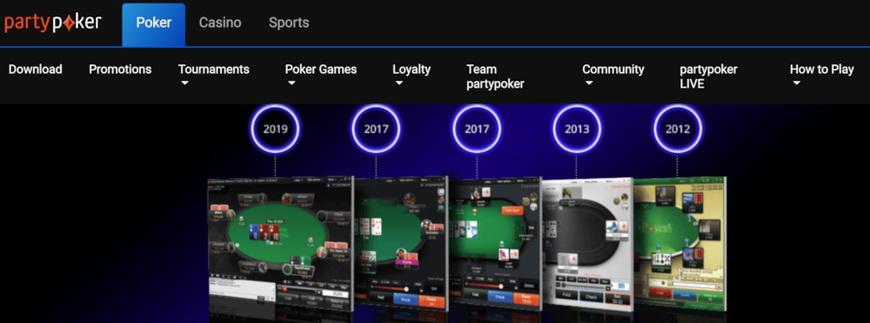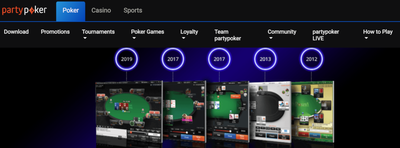

GVC’s online poker site partypoker has introduced a slate of new policies over the last couple of weeks as its efforts to improve the ecology of its player pool and level the playing field continue into 2020.
Perhaps most notable is the introduction of King of the Hill (KOTH) across its heads-up cash game tables. The site has also banned “queuing” third party software, designed to help players avoid other good opponents at “blind lobby” games like Spins, and expanded their real name policy to make it mandatory at satellites and online Day 1s of partypoker live tournaments.
“The changes form part of partypoker’s ongoing drive to make the site the fairest online poker destination,” the operator stated on announcing the introduction of KOTH in late January.
 Sign Up Today »
Sign Up Today »
- New Players Get $30 Worth of Free SPINS Tickets with $20 Deposit.
- Get up to 40% Casback Every Week.
- Try the New Player-Friendly Mobile App!
Only One
The KOTH system aims to reduce the predatory nature of heads-up games and encourage regular players to play each other by restricting the number of tables at each stake.
Players can only wait to play at one table of each type and if they sit out they are ejected from the table. This stops players from waiting for a weak opponent to play: If they wish to keep the table, they must play against all challengers.
The system was popularized by PokerStars, who introduced it in 2013. However, after tweaking the system for a few years, it ultimately went a step further and scrapped traditional heads-up games entirely, switching all tables to fast-fold format.
Heads-up games are generally seen as quite troublesome for an online poker operator: The skill difference between strong and amateur players is pronounced, and new players can go broke very fast at heads-up tables. It thus attracts particularly predatory behavior. Revenue generated at the tables is minimal.
Operators for years have been looking at reducing their impact on overall player ecology. Many newer operators, including Unibet and Run it Once Poker, do not offer heads-up tables at all.
Partypoker floated compulsory real names at all heads-up tables, though it later tweaked this to make real name tables an optional alternative. Last year, the operator first hinted that it planned to switch to a KOTH system in an exclusive interview with pokerfuse last year. It implemented it last month.
“We are continuing to look at ways we can improve the ecology of our network through the introduction of new features,” said partypoker Head of Product, Ross McQuater, said.
“The latest update will greatly improve the experience for those players wishing to play heads-up cash games,” he added. “This is one of many changes we are planning to make to our cash game offering in the coming months.”
Sign up to partypoker today to $30 Worth of Free SPINS Tickets! »
Dequeued
At the beginning of the year, the operator updated its policy on third-party tools with a ban on what it calls “queuing software.” Queuing is defined as “when a player, or a group of players, intentionally try to alter or avoid specific opponents in games where registration is ‘blind’”—that is, in games that do not have a list of tables, but rather a blind lobby. For partypoker, that means its Spins fast-fold game.
The operator has already taken steps to curb seating tools, so this ban is a natural extension of its existing policies.
The first tool to popularize this idea was Spinwiz. Launched in 2015, it allowed players to avoid “friends” in the Spins queue. It did this by effectively maintaining its own global waitlist of software users, and staggering their registrations in a bid to avoid each other.
The tool was banned by PokerStars, and it added a general policy that prohibited “any tool or service that is targeted towards the manipulation of opponents in games in which you are unable to choose a specific table to play on.” While the Spinwiz tool has since shuttered, other private tools that maintain individual queues are presumed to exist.
Real Identities
Partypoker’s experiments with real names also continue. The operator has now rolled out real names at all online satellites to live partypoker events, as well as all online Day 1s. This was a policy first floated last summer that has now been implemented.
“I think something that makes [real names] very relevant when you’re talking about live,” said Tom Waters, Head of Poker at partypoker, on the pokerfuse podcast last year. “When you go into a live tournament, you look at the screen and you see everybody’s names, what their seating position is, who they are.”
“In terms of qualification for these or online day ones for these events, et cetera, why are players hiding under an alias? If you think about it, it’s absolute common sense for you to know who you’re playing in these live events and it just joins the two together,” he added.
The real names policy was first tested last August, coming to high stakes and heads-up cash games; initially it was compulsory, but this was later changed to an optional system: Tables are offered in both anonymous and “real names” formats.
Sign up to partypoker today to $30 Worth of Free SPINS Tickets! »
This latest change, which was implemented two weeks ago, is mandatory. All online “Day 1s, Satellites, Phases and Feeders” to partypoker Live events show real names both at the table and in the tournament lobby for anyone to see, Yong explained on Twitter.
Other Changes
Partypoker’s efforts to improve its player ecology has gone on for years, with countless policy updates and software changes. It includes a crackdown on bots, which has been reportedly so successful it had a meaningful impact on the divisions revenue last year; a near-complete ban on third party tools, including HUDs; changes in time-to-act and many other alterations.
It also recently changed all FastForward tables to play with antes, added run it twice and a new FastForward lobby, and upgraded its new mobile app to support FastForward tables with its new portrait layout.
Various other ideas have been floated but have been tweaked, scrapped, or not yet come to market. For example, it planned to add antes to all cash game tables, but later changed tack and made it optional. Another recurring idea is that of facial recognition at tables, which was first floated last year on the pokerfuse podcast.
“[We] will have face verification technology soon, where they’ll verify that it is Tom Waters sitting on the table through his camera on his phone or his camera on his laptop. I just feel more comfortable that that’s the guy that I’m playing,” said Rob Yong.
The idea resurfaced again this week, with Yong taking to Twitter to poll his followers.

